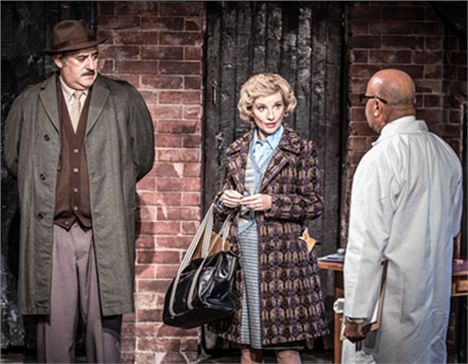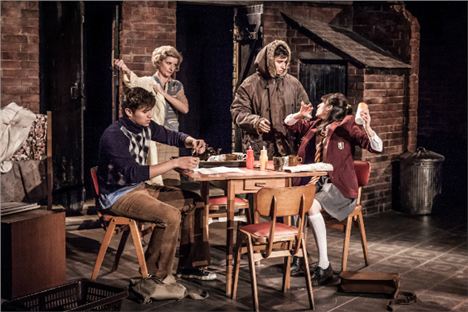AYUB Khan Din’s critically acclaimed play East is East, known to a wide audience through its highly successful film version, is currently on tour at the Manchester Opera House, with Lancashire-born actor Jane Horrocks (main image) as Ella and the writer himself Ayub Khan Din, as her husband George Khan.
The film’s success does bring in an audience to the theatre, but is probably the main reason I found the first act so disappointing - it set a scene I was already too familiar with.
Ella and George’s marriage has produced seven children, six of whom are squeezed into the family home, a terraced chippy in 1970s Salford. Much is familiar territory, the 70s clothes, the closeness of the neighbours, cramped living conditions, gender inequalities as the ‘natural order of things’ and the family tensions.
Sibling rivalry collapses in the face of external threat and the intergenerational misunderstandings rival those of the Steptoe household in their ability to escalate and subside, but never entirely disappear. The fact that Pakistani-born George has married white UK-born Ella adds a cultural collision to the mix.
Quotes of Kipling’s poem, which provided the title: 'East is East and West is West, and never the twain shall meet' - often ignore subsequent lines - 'But there is neither East nor West, Border, nor Breed, nor Birth, When two strong men stand face to face, though they come from the ends of the earth!'
Ayub Khan Din grew up in a mixed race Salford family and the fictional parents, George and Ella, reflect his experience, covering both interpretations of Kipling’s poem with a portrayal of the cultural differences negotiated within a relationship between two strong individuals who are occasionally but only temporarily overwhelmed by the challenge. Din’s writing of the children’s parts is particularly strong.
Judging from the laughs at an early reference to Saleem’s art project, many in the Opera House audience have seen the film. The stage version, through necessity, concentrates the action within the home and backyard, focusing attention on the internal relationships.
The first act is highly claustrophobic and gives an impression of a family who do a lot of talking but very little listening. Even the talents of Sally Bankes as the only outsider ‘Auntie’ Annie, fail to lift the action from a depressing feel.
The second act is more rewarding, with greater story development and punch comedy. Moving the focus to the family’s relationship with the outside world as visitors arrive to arrange a marriage helps to focus character and communication, Sally Bankes lives up to her reputation for classic comedy timing as she recounts to the visiting Shahs how helpful their intended son-in-law has been on the Whit Walks. The art-model scene is well choreographed and particularly effective.
 Ayub Khan Din and Jane Horrocks
Ayub Khan Din and Jane Horrocks
Ayub Khan Din gives George Khan a genuinely likeable side, but doesn’t fully deliver in portraying his internal, often external, rage. Jane Horrocks looks and sounds the part, and performs with great timing, but I found her difficult to hear completely and couldn’t warm to the character. Johndeep More as Sajit, hidden inside a 70s parka for most of the time, moves and talks like a ten year old to great effect. There’s a strong performance too from Ashley Kumar as Tariq, the most distrustful of his father’s attempts to preserve the children’s Pakistani heritage.
Staging a play once it has become a popular film or TV programme can be difficult. The audience knows the plot, and arrives with character expectations. The stage version cannot use visual imagery to fill out the community context, nor give the close-ups that help establish comedy and character. Aunty Annie’s comment brings to recollection the film’s image of the Whit Walks, and benefits from that, but I did miss the close-ups of Sajit’s face as family life tumbles around largely ignoring him.
The film’s success does bring in an audience to the theatre, but is probably the main reason I found the first act so disappointing - it set a scene I was already too familiar with.
This production started life in the West End’s Trafalgar Studios where it gained excellent reviews. The tour has brought the original cast, which is to be welcomed. However, it might have worked better in a smaller space, more in line with the 380-capacity of Trafalgar Studios.
East is East by Ayub Khan Din, starring Jane Horrocks and Ayub Khan Din, is on tour at The Opera House until Saturday 31 January.













